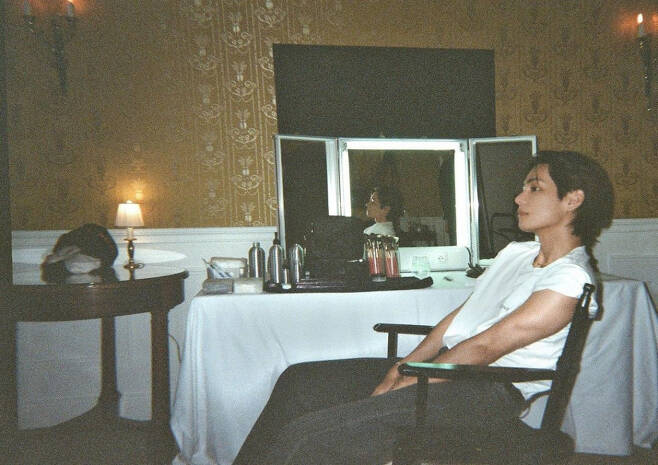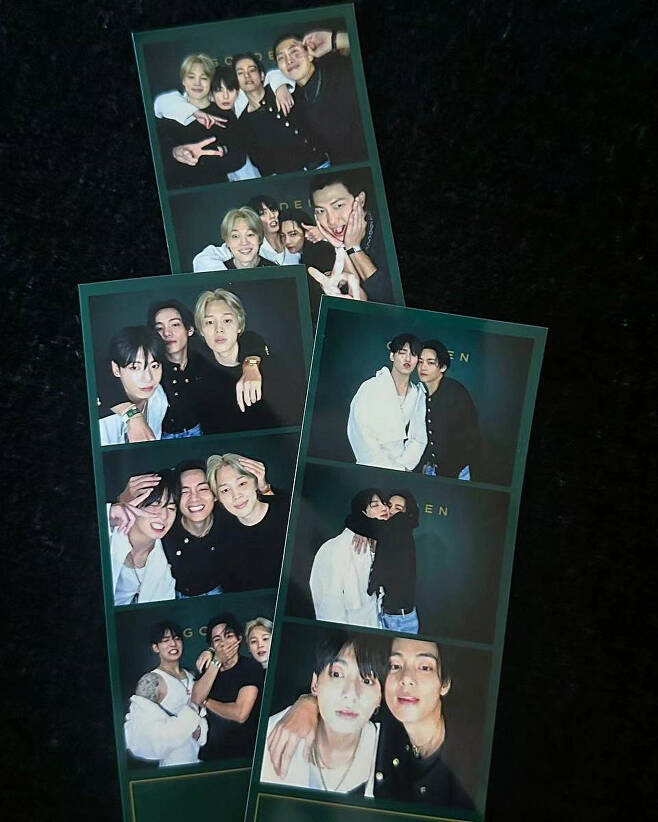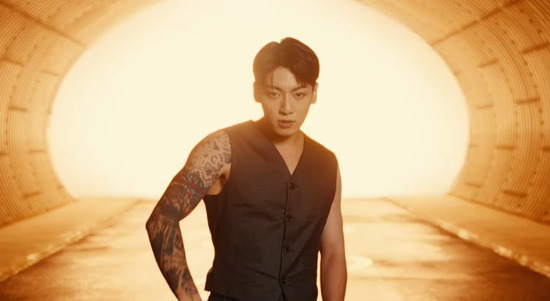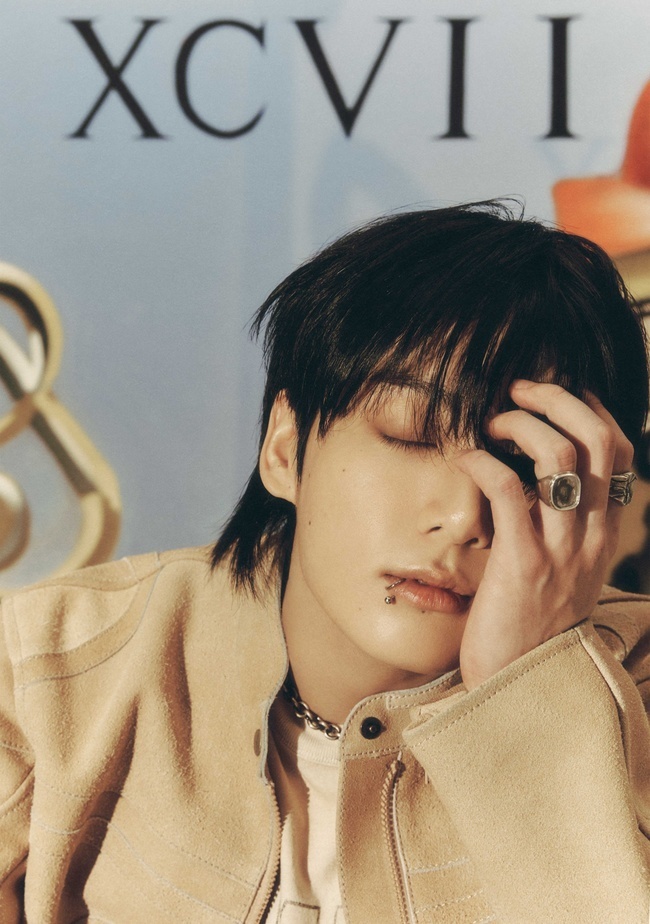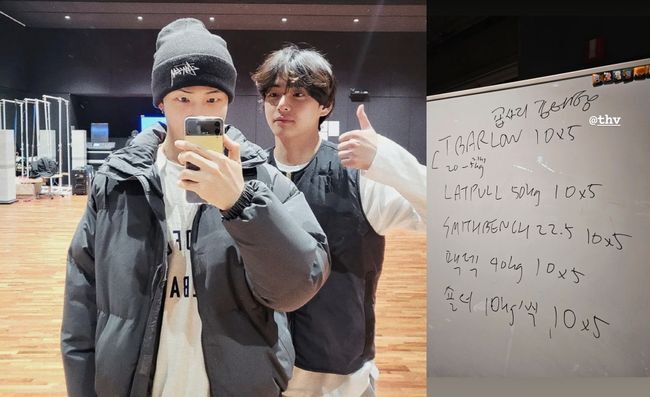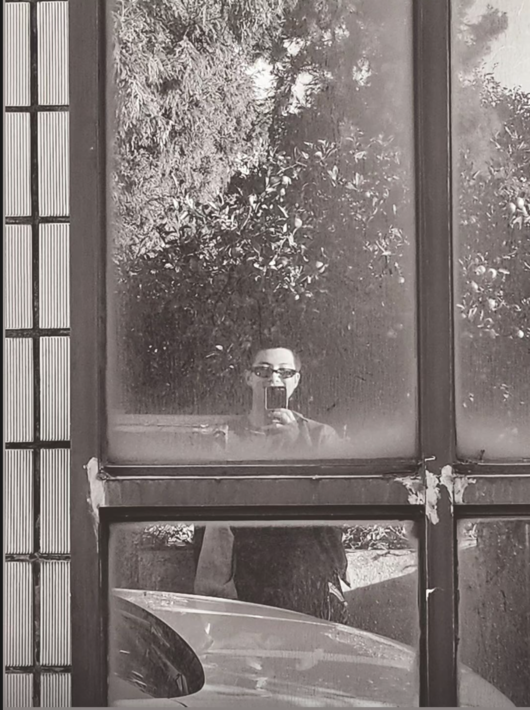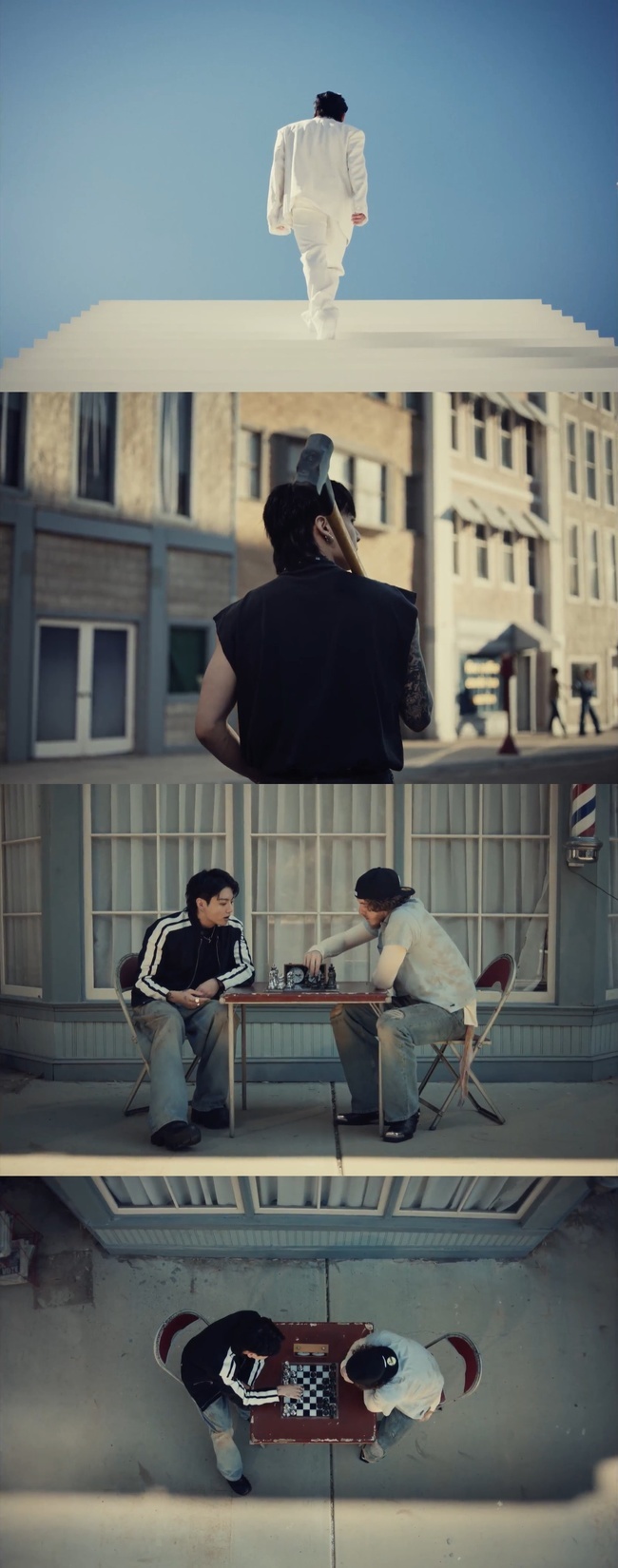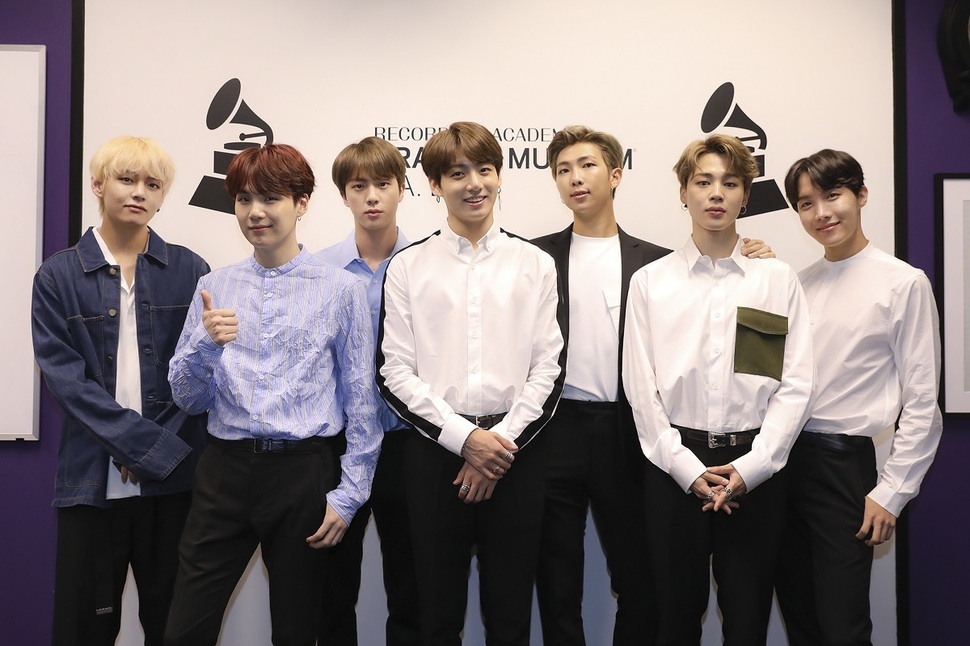
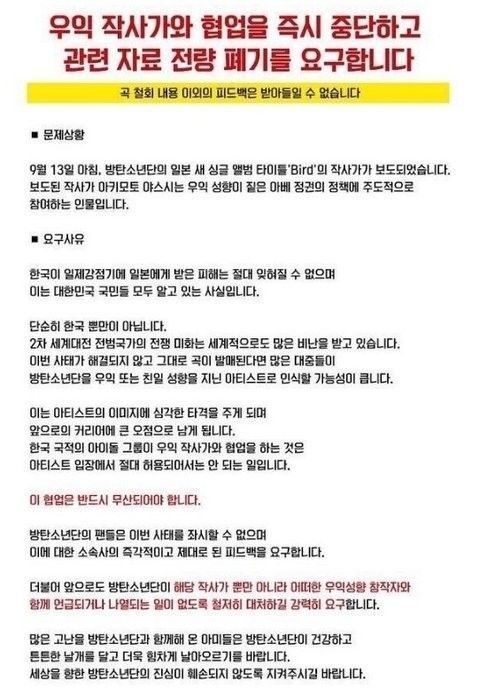

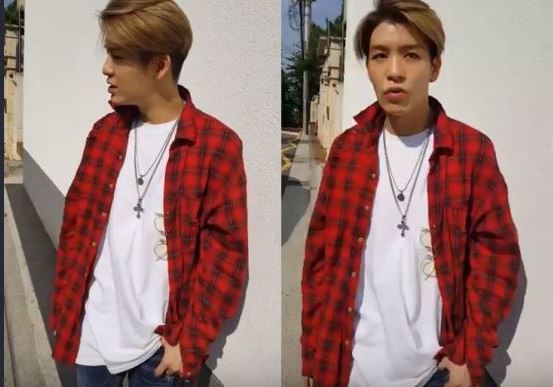
“Stop collaborating with right-wing lyricists and scrap all relevant material.”
It is not the voice of civic groups. It is a statement posted by Ami, a fan club of idol group BTS, on a fan cafe against his agency Big Hit Entertainment.
When Billboard Japan reported on the 13th that Yasushi Akimoto, a Japanese producer, participated in the song "Bud" of BTS' single title song released in November, fans officially expressed their dislike, saying, "The collaboration should be canceled."
The fan club said, “The damage that Korea suffered from Japan during the Japanese colonial rule can never be forgotten. The beautification of war in the war criminal state of World War II is also criticized by World War II. If the song is released, the public is likely to recognize BTS as a right-wing or pro-Japanese artist. "
Although it is a voice that worries that the image of BTS will deteriorate, a lot of people are surprised because it is a meaningful act to not forget our history. They also hold that there are many amicable lyrics among the Japanese idol group AKB 48 songs written by Akimoto. In the end, Big Hit said on the 17th, four days after the controversy, that Akimoto excluded the song Bird from Japan Shinbo. Big Heat said it was a "production reason," but he responded to Ammy's voice.
Ami’s behavior is a prime example of a different version of the Cultural Revolution. No matter how much the star you cheer, it means you don't blindly support their choice. “If we make public opinion, our brothers may be hit, but we can’t just watch it because it’s not good for our country and for our brothers that BTS, which is a World-renowned writer, collaborates with right-wing lyricists,” said a BTS fan in his 20s.
The Brother Unit, which started with Cho Yong-pil, formed the Fandom Cultural Revolution after the first generation idols such as Seo Taiji, children, HOT, and Techs Kies appeared in the 1990s, and developed into a supportor that systematically supports the success of stars when the second generation idols such as TVXQ appeared in 2000. Now, he is going to go one step further, monitor the stars and their agency, reasonably criticize them, and lead them to the right path.
Actor Sol Kyung-gu fan club told Sol Kyung-gu at the press preview of the 2017 film Memory of Murderers when the word "white chime" was used to controversy, he informed the fan cafe about what part he had done wrong and sent a book about feminism to Sol Kyung-gu. A 40-something fan of Sol Kyung-gu said, "Sol Kyung-gu showed his efforts to avoid repeating the same mistakes, such as posting a book certified photo. I think it is true fandom to help the cheering star move in the right direction. "
In December last year, when the idol group's girlfriend's agency produced and sold a 180-cm-sized cushion with photos of its members, fans protested that it was sexual commercialization and boycotted it with hashtags. It's an effort to stop my star from being a sexual target. The agency eventually stopped selling.
If a star repeats his mistakes, he or she will be relentlessly asked to leave the group. Recently, there were suspicions that the private fan club of Sechs Kies Kang Sung-hoon embezzled donations, and when the video of him disparaging the fruit truck passing through the alley saying "This is Cheongdam-dong", there were fans who were going to boycott the Sechs Kies concert if he did not leave. Boycotting concerts is unthinkable during the days of "Brother's Unit." Super Junior fans have demanded his withdrawal after members Kangin repeatedly drove drunk. Moon Hee-joon, Super Junior Sungmin, and others were also boycotted by fans.
The changed fandom started with donations. The 'Cultural Revolution' has brought money to the fans and gave gifts to the star. About 10 years ago, donations were made in the name of the star, and recent donations are thought of history and the environment. In July, actor Lee Kwang-soo's China fan club united to donate 1,000 trees to the forest to prevent desertification in China. The idol group Exo Fan Club sponsored the Busan comfort women's history museum, which had difficulties in renting and operating expenses.
The growth of fandom is due to the fact that the star, who was the object of longing, is now recognized as a 'raising being'. Kim Sun-Young, a public critic of Cultural Revolution, said, "Produce 101 is popular and stars are considered to be fostered three to four years ago. My star says that the idea of me growing well makes fandom public.” In fact, Ami took the lead in promoting BTS by posting her own promotional content on YouTube. The group JBJ was formed because fans made a union of members and demanded their debut. Kim Sun-Young, a critic, said, "I am a 'pic' star, so I want to show The Good Detective. “The more my star grows, the more I feel self-esteem,” he said.
“As media such as social networking services (SNS) develops, fans can express their opinions much faster and more systematically than before,” said Kim Yoon-ha, a music critic. The biggest reason for the change in fandom is that fandoms such as the community and the hashtag movement have made their voices loud, and the media and media have easily noticed them, and the agency and The Artist have quickly caught their reactions. " There is also an analysis that the diversity of the age group of the fan group is combined with various ideas and reaches a reasonable conclusion.
The voice of fandom has expanded to history and social problems since Korean content has been constantly consumed as global media such as YouTube. “When a music video of a female singer who says that a fat woman is getting prettier and prettier to seduce a man in 2014, it became controversial among overseas fans when it was posted on YouTube. “The reaction to Korea was like ‘I had a hard time making up special makeup’,” he said. “As I began to recognize that Korean creations are not domestic but global content, I was concerned about each expression.” “The reason for the change is that the generation has changed, as the global generation, these days, the teenagers and thirties, have a high critical consciousness of social problems,” he said. “I want to be The Good Detective group that represents Korea, so I read the lyrics and interviews carefully,” said a Wanna One fan.
The good competition to make the image of my star better among fan clubs also affects. Kim Sun-Young, a critic, said, "Prior to Sol Kyung-gu, feminist book support has become common since actor Kim Yoon-seok's sexual harassment remarks. If a fandom leaves The Good Detective case of dealing with a problem, it will be affected by other fandoms and make it a universal Cultural Revolution. "
Tension is important, but there are concerns that it may hinder creativity. "More than anything, we need the awakening of the creators," said Cho Woo-jin, a critic.
The fashionable banquets among fan clubs these days show a different fandom: You love me, but you’re bullshit now.
In the new BTS song, Japan right-wing musician expressed opposition to the fan club. Big hit, sexual harassment actors except the song, 'feminism book support' and 'global star' were born, and the awareness of 'star is growing by fans' increased.
